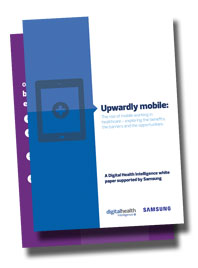 Recently published, The Digital Health Intelligence white paper explores how the healthcare sector is embracing mobile technology to deliver the transformational change required to provide high-quality care for future generations.
Recently published, The Digital Health Intelligence white paper explores how the healthcare sector is embracing mobile technology to deliver the transformational change required to provide high-quality care for future generations.
Like other parts of the public sector, healthcare is embracing transformational change to meet the challenge of providing high-quality care for future generations. This white paper represents a key piece of research into the potential benefits of mobile working in healthcare and considers the obstacles that will be surmounted along the way.

Its conclusions were positive overall, with 96% of healthcare professionals and senior managers seeing the benefits of working remotely. Positives included cutting down on travel time and being able to work more effectively on the move. Putting information at the fingertips of staff, wherever they happen to be, meaning that doctors and nurses can make more informed decisions and improve clinical outcomes. Communication with patients is improved by mobile technology too, helping everyone stay better informed and healthcare professionals to work more productively and efficiently.
Benefits and barriers
While these benefits are widely understood, there are also barriers to adoption, as Gregg Hardie, Head of Public Sector at Samsung, noted. ‘The research shows that mobile working is a real benefit to healthcare professionals, helping them to work more flexibly, access information more easily and deliver better patient outcomes. However, we also understand that there are issues and barriers to contend with during any big transformational change.’
Security is one of the main issues, especially given recent high-profile cases, such as the now infamous WannaCry attack, which hit a large part of the NHS. However, the careful selection of products and suppliers can help reduce the risk of cyber-attacks and data breaches. For instance, Samsung’s defence-grade Knox mobile security is built into devices’ hardware and software and works around the clock to prevent hackers accessing confidential data. There’s even the option to set up secure personal and business compartments on the same device. So in the event of a device being lost, a hospital can disable access to sensitive data remotely. Culture and the ‘old school’ perception that remote working equals not actually working can be overcome by helping staff to understand they’re reducing risk for the patient and how they can identify issues quicker.

TD SYNNEX Tech-as-a-Service (TaaS)
The other big barriers are cost and budget constraints. Thankfully, there are options available that enable healthcare providers to invest in technology without any large initial financial outlay, such as TD SYNNEX Tech-as-a-Service. This as-a-service model works on the basis of a monthly or quarterly fee, with NHS organisations able to cherry pick the additional services and solutions they want on top. With TD SYNNEX Tech-as-a-Service you can also offer Samsung Managed services which include support services, repairs, device deployment and training.
The Digital Health Intelligence white paper points out that NHS Trust staff must understand and buy into the benefits that new working methods can provide if the introduction of mobile technology is to be successful. Getting them involved early in the consultation process on new solutions and processes is vital. But there is every reason to be optimistic, said Hardie. ‘These issues can be overcome – we’ve already achieved some great outcomes supporting healthcare organisations with an array of issues.’ The paper concludes that, as more useful healthcare-specific applications become available and infrastructures improve, mobile technology will become even more essential to creating a world-class healthcare service.
The pros and cons of mobile IT in healthcare
KEY BENEFITS
- Increased productivity and greater efficiency
- Decreased need for staff to travel, and resulting cost savings
- Increased patient safety
- Better understanding of capacity within hospitals
- Better engagement with patients, more patient-centric care, and patients able to more easily offer feedback
- Less disruption to staff on call
MAIN BARRIERS TO ADOPTION
- Budget
- Lack of organisational support
- Poor connectivity or infrastructure issues
- Security concerns
- Technical or interoperability barriers
- Organisational culture
To request a copy of the Digital Health Intelligence white paper on the benefits, barriers and opportunities of mobile working in healthcare, please email hannah.harris@techdatamobile.com


